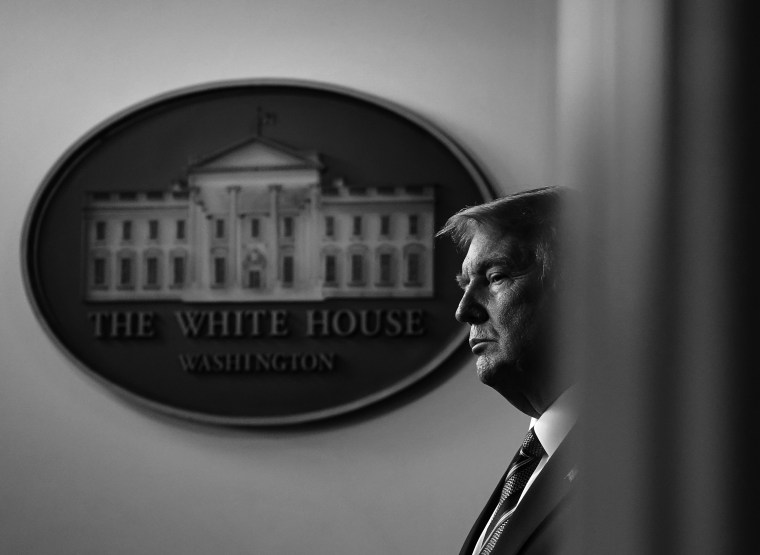With multiple crises unfolding simultaneously, one might expect to see an American president deliver a national address of some kind. But the Washington Post spoke over the weekend to a senior administration official who said Donald Trump and some members of his team have decided "he should not speak to the nation because he had nothing new to say and had no tangible policy or action to announce yet."
But if that doesn't seem like a satisfying posture, it's not your imagination. The United States continues to struggle with a deadly pandemic; 40 million Americans have filed for unemployment since mid-March; and there's unrest in communities across the nation, with protestors taking to the streets to condemn racial injustices and violence against people of color.
But the president doesn't have anything "new to say" and has "no tangible policy or action to announce yet."
It got me thinking about something Chris Hayes said on his show on Thursday night:
"[T]here is no plan from the president who warned against 'American Carnage' -- the carnage and chaos we are living through now. Not the pandemic, not the economic crisis, not societal inequities, not predatory policing, not the protests in Minnesota, nothing except to make it all worse."
Bloomberg's Jonathan Bernstein stressed the same point in a related column this morning: "Trump simply seems to have given up on the job. He's had no policy on the pandemic for about a month now. He basically has no policy on recovering from the economic calamity. And he has no policy to deal with the police violence, demonstrations and the rest of the upheaval that has gripped the nation for the past week."
There's nothing hyperbolic about the observation. When Congress required the White House to produce a national testing strategy on the coronavirus, Trump and his team responded with a document that effectively dumped the problem on governors. When reporters asked the president for his economic plan, he acted as if he barely understood the question.
Pushed to have some kind of constructive response to widespread protests, Trump seems to have gone out of his way to make matters worse.
Americans are confronting a public-health crisis, an economic crisis, and a justice crisis, but stepping back, there's also an overarching governing crisis. My upcoming book isn't about the ongoing crises, per se, but it makes the case that Trump is a post-policy president who lacks the wherewithal to use the levers of power effectively to serve the nation's interests.
The fact that Trump has no policies or substantive agenda in any of these areas bolsters the underlying point.
So what does the president have? A preoccupation with his desire to maintain power. The New York Times asked the White House yesterday about Trump's intentions to address national unrest. He replied through an aide, "I'm going to win the election easily."
The president added on Twitter this morning, "NOVEMBER 3RD" -- an obvious reference to Election Day -- before publishing an another item, referring to himself in the third person, that read, "'Trump' is leading in all swing states."
He may not have a plan, a vision, or an agenda, but the president has all sorts of thoughts about his campaign prospects.
Twelve years ago, when Barack Obama embraced "hope" as a central theme of his presidential campaign, the common refrain from skeptics and detractors was, "Hope is not a plan." That was true, of course, which is why Obama, an unabashed technocrat, went to great lengths to bolster his vision with a meaningful policy platform.
In 2020, Trump hasn't endorsed "hope" as a message, but it nevertheless seems to be guiding his thinking. He hopes the coronavirus will go away. He hopes state officials will address the public-health crisis in such a way that helps him avoid blame. He hopes the economy will recover before Election Day. He hopes re-opening initiatives will be enough to reduce unemployment quickly. He hopes governors will get "tough" and end protests.
The president doesn't have a plan, but he has hopes that others will make his problems go away.
Hope is not a plan, but without a plan, there's little hope.

